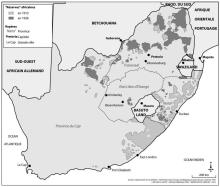Land Library Search
Through our robust search engine, you can search for any item of the over 73,000 highly curated resources in the Land Library.
If you would like to find an overview of what is possible, feel free to peruse the Search Guide.
/ library resources
Showing items 1 through 9 of 122.The formation and occurrence of urban heat island (UHI) is a result of rapid urbanization and associated concretization. Due to intensification of heat combined with high pollution levels, urban areas expose humans to unexpected health risks.
Land use governance in the Brazilian Amazon has undergone significant changes in the last decade.
Food aid is a critical component of the global food system, particularly when emergency situations arise. For the first time, we evaluate the water footprint of food aid. To do this, we draw on food aid data from theWorld Food Programme and virtual water content estimates from WaterStat.
The recent phenomenon of large-scale acquisition of land for a variety of investment purposes has raised deep concerns over the food security, livelihood and socio-economic development of communities in many regions of the developing world.
India and China are two similar developing countries with huge populations, rapid economic growth and limited natural resources, therefore facing the massive pressure of ensuring food security.
This paper examines the spatial and temporal trajectories of Seattle’s industrial land use restructuring and the shifting riskscape in Seattle, WA, a commonly recognized urban model of sustainability.
Os processos sociais que são objeto das análises dos capítulos que compõem este livro, embora carregados de particularidades próprias, uma vez que tratam de diferentes contextos sócio espaciais e temporais, são atravessados por algumas similitudes e pontos em comum.
Date: 2015
Source: Foncier & Développement
Par: Cécile Travési, Maïa Ponsonnet
En atención a los problemas de contaminación y al estrés hídrico que se dan actualmente (y que repercuten en la salud y en las condiciones de vida de las personas) se considera relevante analizar el tema del acceso al agua potable a la luz del Derecho Internacional Público, con el fin de identifi



